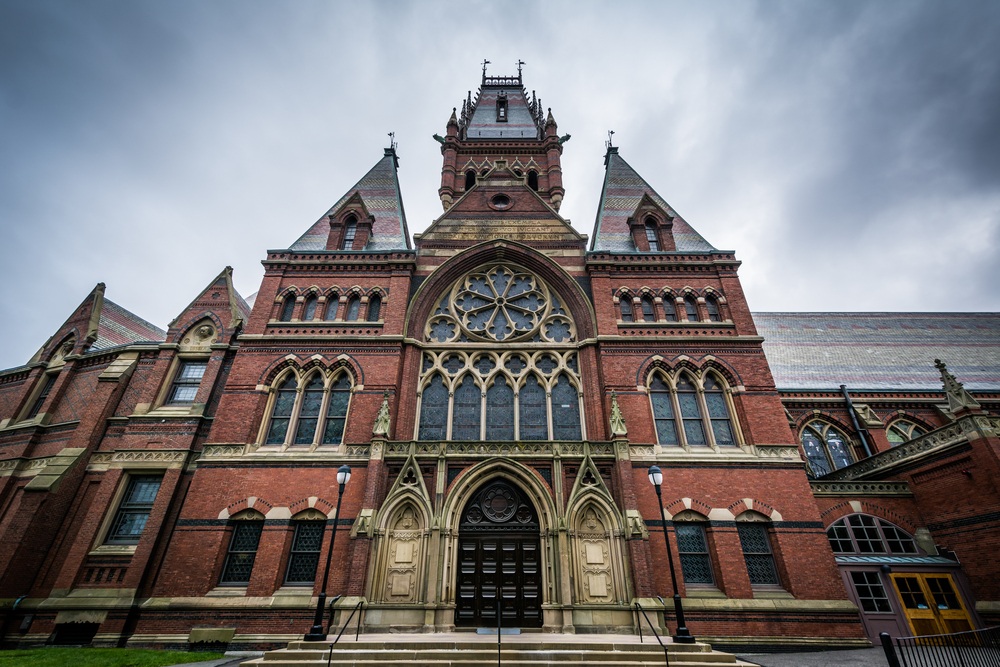Fraternities, sororities sue Harvard, saying penalizing those in single-sex clubs violates Title IX

Harvard Memorial Hall. Shutterstock
A group of fraternities and sororities filed a federal lawsuit Monday that challenges Harvard University’s recent policy prohibiting students who belong to unrecognized single-gender organizations from holding campus leadership positions or competing for some post-graduate scholarships and fellowships.
A similar action was filed in Suffolk County Superior Court, the Harvard Crimson reports.
The U.S. District Court suit alleges discrimination under Title IX, focusing on a Harvard policy announced in 2016.
“Harvard originally said that male students should be punished for joining men’s groups because those groups are responsible for a disproportionate share of sexual assaults at Harvard and contribute to racism, sexism, classism, and homophobia,” the complaint states. “Then Harvard said that male students should be punished for joining men’s groups because the existence of all-male organizations makes women ‘second-class citizens’ and ‘restrict[s] women’s liberties.’ ”
In its explanation of the policy, Harvard’s website uses the term “unrecognized single-gender social organizations” to describe groups including fraternities, sororities and final clubs. Town & Country Magazine covered final clubs in a 2016 piece about “exclusive student clubs of the Ivy League.”
A 2016 report for Harvard found that the all-male final clubs had “deeply misogynistic attitudes” and linked them to sexual assaults, the Washington Post reports.
The Harvard policy also prohibits students in the single-gender clubs from leadership positions in school athletics teams, according to its website. The policy was announced in May 2016 and took effect for the graduating class of 2021.
“Harvard College seeks to build a community in which every student can thrive, and it does so on a foundation of shared values, including belonging, inclusion, and non-discrimination,” Rachel Dane, Harvard’s director of media relations, told the ABA Journal in a statement. “The policy on unrecognized single-gender social organizations (USGSO) is designed to dedicate resources to those organizations that are advancing principles of inclusivity, while offering them supportive pathways as they transform into organizations that align with the educational philosophy, mission, and values of the college.”
This is the first legal challenge to the Harvard policy, according to the Post. Plaintiffs on the federal complaint are sororities Kappa Alpha Theta and Kappa Kappa Gamma, and fraternities Sigma Chi and Sigma Alpha Epsilon, as well as three unnamed students who are members of all-male clubs at Harvard. The state court action was brought by sororities Alpha Phi and Delta Gamma. Both actions seek injunctions to prohibit the policy from being enforced; the state court action also seeks undetermined damages.
Ada Añon, an Arnold & Porter associate who represents the plaintiffs in the federal lawsuit, told the ABA Journal that there are a handful of fraternities left at Harvard, but no all-female sororities. She adds that some of the sororities still in existence started admitting men.
Dane says that Harvard has not had a Greek system on campus for more than a century. “As President Faust and the Harvard Corporation said in December of 2017, it is the expressed expectation of this community that Harvard should not become a Greek school. Harvard should not have to change its commitment to non-discrimination and educational philosophy for outside organizations that are not aligned with our long-standing mission.”
Updated on 4:54 p.m. to add comment from Harvard.



